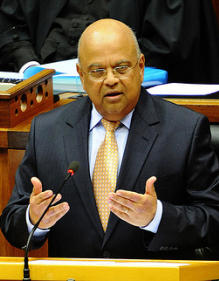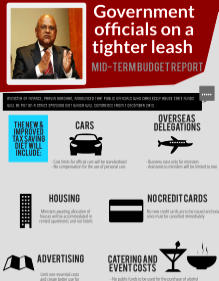|
Getting your Trinity Audio player ready...
|
 Public servants who have freely flashed their official credit cards in the past, have been put on a spending diet – finance minister Pravin Gordhan has announced in his 2013 medium term budget policy speech that this and other perks are to be curtailed.
Public servants who have freely flashed their official credit cards in the past, have been put on a spending diet – finance minister Pravin Gordhan has announced in his 2013 medium term budget policy speech that this and other perks are to be curtailed.
Speaking in Parliament yesterday, Gordhan devoted a significant portion of his speech to explaining plans to curb wasteful expenditure in the government. The 2013 budget was the first since 1999 that did not add resources to previously announced spending plans, meaning that initial estimates have not been revised upwards for 2013.
Gordhan mentioned that there were “many opportunities to cut or minimise costs and stop abuse" of public money. The aim, he said, is to improve the quality of public expenditure, making resources available for the implantation of the National Development Plan, and to “combat waste, inefficiency and corruption”.
Corruption Watch has focused strongly on this issue, as have other platforms and organisations. Public outrage has been building in the past few years, fuelled by regular reports of government extravagance in decorating offices, travelling with big entourages, inexplicably excessive catering costs, using public funds to pay for family holidays, buying thousands of rands’ worth of fast food using a credit card, and staying in five-star hotels.
Since January 2012 Corruption Watch has received 469 reports explicitly citing abuse of public funds by government officials. Most of them came from Gauteng province (39.38%), followed by the Free State at 11.25%, and KwaZulu-Natal and Limpopo, at 10% each. The majority of the reports implicated local government (35.63%), with provincial and national government evenly spread at 21.88% and 24.38% respectively.
Gravy train rolls to a halt
Gordhan addressed all of these concerns, and more, in his speech, elaborating on strict new guidelines for the purchase of cars, overseas and local travel, housing, the use of consultant services, and catering and advertising.
“This is definitely a step in the right direction and follows the lengthy public outcry over wasteful expenditure by senior government officials,” said South African Chamber of Commerce and Industry CEO Neren Rau.
The restrictions come into effect on 1 December. Once they are in force, Parliament and the public will be invited to help monitor compliance, said the Treasury in its full budget statement.
Credit cards will be cancelled immediately and no new ones will be issued, said Gordhan. This is welcome news – Corruption Watch has previously reported on big spenders Humphrey Mmemezi, the former Gauteng MEC for local government and housing as well as Speaker Lindiwe Maseko, both of whom were alleged to have misused public funds and in Maseko’s case, there was a conflict of interest matter also.
The minister also mentioned that, in terms of rebuilding confidence in the government, the department of economic development has developed a plan “to ensure that competition is not undermined by collusive practices”. Earlier in 2013 the country was rocked by the exposition of massive collusion in the construction sector. During the hearings, Corruption Watch made a submission to the Competition Tribunal, in which it called for all parties affected by the cartel’s actions to lay criminal charges against the construction companies for damages suffered.
Read below the extract from Gordhan’s speech which deals with cost-cutting and clampdown on abuse:
As government, we acknowledge that we too must provide value for money. Although most government spending is effectively managed, there are many opportunities to cut or minimise costs and stop abuse. In these difficult times, Cabinet has decided to take a number of initiatives which will apply both to members of Cabinet and to officials in national, provincial and local government. This will include state entities and state-owned enterprises.
As the former president of Brazil, Lula da Silva, said, "Poor countries must give an example of honesty, of ethics, so that we truly deserve the solidarity from millions and millions of people who would like to contribute but sometimes are not sure their money will go where it should go."
In respect of the Executive, including provincial and municipal Executives, Cabinet has of its own accord has decided the following:
Cars:
- The cost limits for official cars will be standardised
- Bulk purchasing will be used to reduce costs
- Security features will be a consideration
- There will be no compensation for use of personal cars.
Overseas delegations:
- Business class only for ministers
- Assistants to ministers will be limited to two
- Direct routes will be used
- Number of officials to be kept to a minimum.
Housing:
- Ministers awaiting allocation of houses will be accommodated in rented apartments not hotels
New refurbishment guidelines for limiting costs will be developed.
No new credit cards to be issued and existing ones to be cancelled immediately.
Our approach to reducing costs and eliminating wasteful expenditure in the rest of government will focus on six areas over the period ahead:
1. The largest is consultant services. There are of course necessary engineering and advisory services employed by government departments. However, we need:
- Better contract management
- Stricter control of consultancy fees
- Each government entity to develop a consultancy reduction plan over the course of this financial year.
2. No credit cards.
3. Travel and related costs:
- Hiring of cars to be restricted to B Class except for special instances such as rural travel
- The number of officials travelling to Cape Town offices will be limited
- The Leader of Government Business will engage with Parliament on measures to reduce costs, such as the size of delegations appearing before parliamentary committees, and the cost implications of the current Pretoria-Cape Town arrangement
- Business class for overseas travel for DGs and DDGs only
- Business class for DGs only on domestic flights.
4. Advertising:
- Guidelines to limit non-essential costs and for better use of GCIS facilities will be developed.
5. Catering and event costs:
- Guidelines will be developed for reducing event costs, including better use of government facilities rather than outside venues for meetings
- No public funds to be used for purchase of alcohol
- The entertainment allowance will be limited to R2 000.
6. Following the review of accommodation leases initiated by Minister Nxesi, steps are under way to reduce long term office accommodation and government housing costs and make further savings from electricity demand management measures in government buildings.








